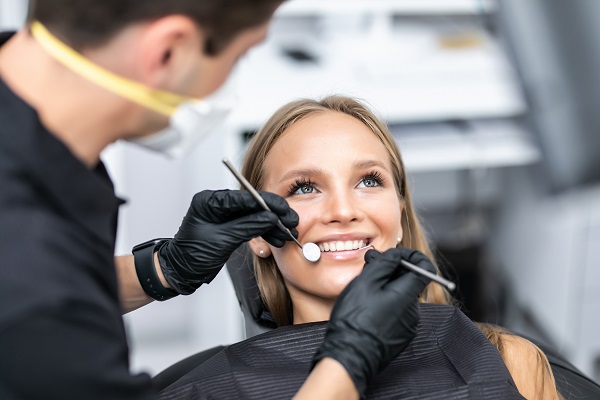Can Teeth Be Sensitive After Teeth Whitening?

Professional teeth whitening is a safe and effective way to remove stubborn stains and improve the appearance of your smile. However, it can cause a temporary side effect called dentinal hypersensitivity. This can cause your teeth to react with discomfort to foods that are acidic, sweet, or sour or to temperatures of hot and cold.
Dentinal hypersensitivity from whitening is usually temporary and resolves after a few days. In the meantime, there are things you can do to help keep it under control.
What causes sensitivity after teeth whitening?
Each tooth contains microscopic channels that start at the surface of the enamel and extend down to the nerves at the center of the tooth. These channels are called dentinal tubules. The reason that teeth whitening agents work so well is because they can penetrate deep down into the enamel. As a result, they sometimes get into the dentinal tubules and irritate the nerves within the tooth.
This is the most common cause of sensitivity from teeth whitening. It can also occur because of irritation of your gums when the bleaching gels come in contact with them. If your dentist uses whitening trays that you bite down into, teeth may become sensitive due to the pressure exerted on them during the whitening process.
What can you do about sensitivity from teeth whitening?
There are things that you can do before the treatment to help reduce sensitivity. If you still experience symptoms following the treatment, there are things you can do to lessen those symptoms.
What to do before treatment
Starting a week to 10 days prior to your appointment, you can brush your teeth with a desensitizing toothpaste. This has ingredients that help to block pain signals at the surface of the tooth from reaching the nerves at the center. It may also cover up the tubules, blocking the bleaching agents from reaching the nerves.
Just prior to treatment, you can apply a desensitizing gel to your teeth. Follow the directions provided on the package for applying the gel and then rinsing it off with water.
What to do after treatment
You can continue to use toothpaste for sensitive teeth for brushing after your whitening treatment. Be sure to use a soft-bristle brush to avoid any damage to the enamel. Fluoride is a mineral that helps to build up tooth enamel, so use dental hygiene products that include it to help to build your teeth back up more quickly after whitening. Use lukewarm water rather than cold to brush your teeth and rinse your mouth.
For the first few days after teeth whitening, choose foods and drinks that you can enjoy at room temperature and avoid any foods that are too sugary or acidic. If this is not possible, you can prevent potentially irritating beverages from reaching your teeth by sipping them through a straw.
Conclusion
It is normal to experience some sensitivity following teeth whitening. This is temporary and usually goes away within a few days. You can try desensitizing toothpaste prior to treatment to try to prevent the sensitivity, and there are several steps you can take after the treatment to reduce the symptoms until they resolve completely.
Request an appointment here: https://www.drhai.com or call Ping Hai DDS at (770) 239-2722 for an appointment in our Marietta office.
Check out what others are saying about our dental services on Yelp: Teeth Whitening in Marietta, GA.
Recent Posts
In-office teeth whitening is an effective solution for removing teeth stains and achieving a brighter smile. However, the results will not last as long without proper aftercare. Fortunately, there are effective ways to make the results of your teeth whitening procedure last longer. The key to making your in-office teeth whitening last is to practice good…
Before delving into the process of teeth whitening, we should consider the problem — teeth stains.The tooth consists of a hard exterior layer that protects the layer underneath, particularly the dentin. Anything that enters your mouth – cigar, coffee, food – creates a second layer on the enamel slowly. The external materials build up to…
Teeth whitening has spilled into the mainstream for good reason: it works and it does not drain your savings. For all the good teeth whitening does, there is the slight potential for a little bit of bad.In general, teeth whitening does not pose a threat to the teeth. However, some patients take the DIY (do…
You will obtain the answer to this question after a consultation with your dentist. Your dentist will perform a thorough oral examination including X-rays to gauge the cause of the discoloration. The dentist will then go over teeth whitening options with you. He or she will help you achieve the perfect shade of white for…



